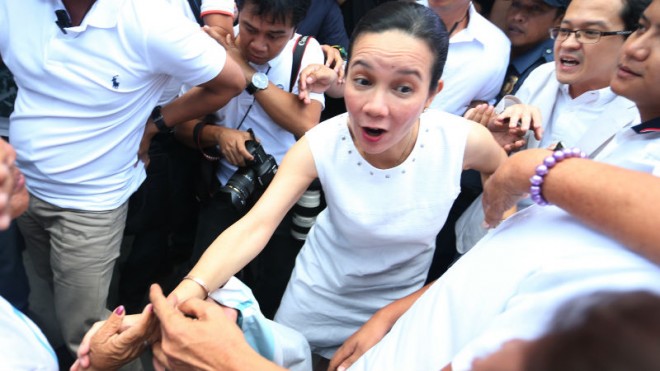Disqualification case belongs to DOJ–Poe

Presidential aspirant Grace Poe is mob by her supporters as she leaves after the hearing for disqualification case filed against her at the COMELEC en banc in Palacio Del Gobernador, Intramuros, Manila.
EDWIN BACASMAS/INQUIRER FILE PHOTO
Sen. Grace Poe’s camp believes that the Commission on Elections (Comelec) does not have primary jurisdiction over the petition filed by a former Government Service Insurance System (GSIS) lawyer, questioning her qualification to run for President in the May 2016 polls.
“The DOJ (Department of Justice), and not this Honorable Commission, has primary jurisdiction to revoke the Bureau of Immigration (BI) July 18, 2006, order which: found respondent presumptively a former natural-born Filipino; and approved her petition for reacquisition of natural-born Filipino citizenship,” said Poe in her verified answer to lawyer Estrella Elamparo’s petition.
Poe was referring to the BI order that says she was a former citizen of the Republic of the Philippines being born to Filipino parents and is presumed to be a natural-born Philippine citizen, and is deemed to have reacquired her Philippine citizenship.
Poe explained that the BI rules provide that its order can only be revoked by the DOJ upon a substantive finding of fraud, misrepresentation or concealment on the part of the applicant.
“Evidently, the DOJ has the primary jurisdiction or the power to ‘make the initial decision’ to rule on whether reacquisition of natural-born Filipino citizenship evidenced by the July 18, 2006, order, was valid,” she said in her verified answer filed at the Comelec’s second division.
Article continues after this advertisement“Applying the doctrine of primary jurisdiction, until the DOJ has been given the chance [in the appropriate administrative proceeding] to decide the issue, this Honorable Commission should ‘refrain’ from deciding whether respondent… was, indeed, a former natural-born citizen of the Philippines qualified under the terms of that statute,” she added.
Article continues after this advertisement3 more cases
On Tuesday, Poe went to the Comelec for the hearing of Elamparo’s petition to disqualify and/or deny due course to the senator’s certificate of candidacy (COC).
Poe is also facing separate petitions, specifically one that seeks her disqualification from the presidential race filed by former Sen. Francisco Tatad; a petition for the cancellation of her COC filed by De La Salle University professor Antonio Contreras; and a petition to deny due course to her COC filed by former University of the East Law dean Amado Valdez.
Poe’s camp also said the nature of Elamparo’s petition should be lodged before the Presidential Electoral Tribunal (PET), and filed only if Poe is proclaimed President of the Philippines.
“Petitioner is evidently seeking a declaration from this Honorable Commission, even before the conduct of the May 9, 2016, elections, that respondent is ineligible for the presidency. However, there is no proceeding to specifically declare the ‘ineligibility’ of a candidate before the election,” said Poe.
Such proceeding for declaration of ineligibility is aimed at removing the incumbent from office, therefore also making the petition “premature,” she said.
“Since the petition basically seeks a ruling on respondent’s ineligibility for the presidency, it is in essence a petition for quo warranto. Since the petition is fundamentally one for quo warranto, it is obviously premature, because no elections have been held yet and respondent has not been proclaimed winner,” Poe said.
“Moreover, in the event that respondent is elected and proclaimed President, petitioner would have to file his petition with the PET (which is the ‘sole judge’ of all contests relating to the ‘qualifications of the President’). This Honorable Commission therefore lacks jurisdiction over the Petition,” she added.